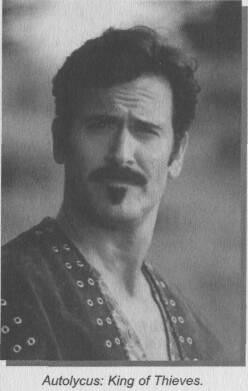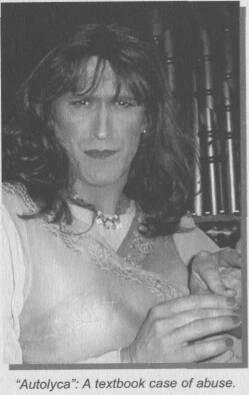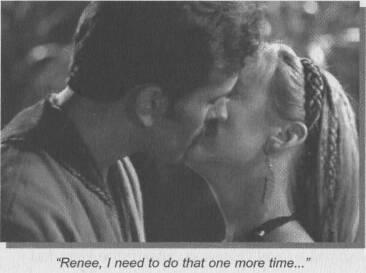If Chins Could Kill: Confessions of a B Movie Actor (52 page)
Read If Chins Could Kill: Confessions of a B Movie Actor Online
Authors: Bruce Campbell
Tags: #Autobiography, #United States, #General, #Biography & Autobiography, #Biography, #Entertainment & Performing Arts - General, #Entertainment & Performing Arts, #Actors, #Performing Arts, #Entertainment & Performing Arts - Actors & Actresses, #1958-, #History & Criticism, #Film & Video, #Bruce, #Motion picture actors and actr, #Film & Video - History & Criticism, #Campbell, #Motion picture actors and actresses - United States, #Film & Video - General, #Motion picture actors and actresses

Ironically, I began acting in New Zealand
after
I directed down there.
The role of Autolycus, AKA the King of Thieves, came about following a call from Rob Tapert. He felt that this character, a despicable rogue, was just right for me. I wasn't sure if Rob's endorsement was an insult or a complement, but upon reading the script, aptly titled "The King of Thieves," I wholeheartedly agreed.
As things evolve in the fluid world of TV, characters crop up that can be useful in subsequent episodes. Autolycus, I'm happy to say, fell into this category. From a series point of view, he could be a source of aggravation for Hercules, yet the "thief with a heart of gold" aspect made him slightly more useful.
As the seasons rolled along, "Auto" began to steal his way into more episodes. Nineteen ninety-eight proved to be a banner year for a number of reasons. Kevin Sorbo was confronted with a life-threatening physical condition and had to drastically pare back the amount of hours he could work per episode. I was asked to assist with the very large task of taking up the slack. Fortunately for the show, Michael Hurst as Iolaus, the trusty sidekick, was more than up to the job as well.
While I was delighted and relieved to see that Kevin has made an apparently full recovery, it did provide for some unique episodes in his absence. These are the times to pity the writing staff of a TV show -- they had to produce a raft of new story ideas out of thin air and, I think, to a large degree, they succeeded.
My deal with the studio at that point was to be in eleven episodes between
Hercules
and its popular spawn,
Xena: Warrior Princess.
It was always a pleasure to see what the writers had dreamt up next. Usually the titles gave you a basic idea of what you were in for.
An episode called
Porcules
confirmed an actor's motto: never perform with animals or children. Hercules, by a cruel act of the gods, is transformed into a pig, complete with leather pants. Nothing beats the sight of a gyrating pig, racing across the countryside, desperately trying to shed the little costume velcroed to his body.
Pigs, in case you've never been around one, also make noise. On its best behavior, a pig utters an endless stream of grunts, since they're always looking for food. As their impatience grows, so does their decibel level. A disgruntled pig can launch a litany of squeals that could drown out even the loudest actor.
Pigus New Zealandus
also have nasty, cloven little hoofs. I watched with great pity as Hercules' mother, Alcmene, attempted to share a tender moment with her "son." The cradled pig transformed into a bruise machine as it stampeded across the poor actress' legs.
It seemed like the writers spent most of their time concocting ways to extract revenge on the actors. "Men in Pink" was a textbook case of such abuse -- it called for my character and his unlikely partner, Salmoneous (played by the irascible Robert Trebor), to cavort in drag.
What's the big deal?
I thought.
Ya slap on a wig, a little extra makeup and bing, bang, boom -- away you go.
In addition to the basic humiliation of changing sexes, our "female" characters had to perform a strip tease -- this meant that almost all manly body hair had to be removed. Here's a Kodak moment for you: Bruce standing buck ass naked in his Auckland bathroom, while a ghastly cream denudes him of precious hair.
After festering for some twenty minutes, the hair on my body decomposed into a seaweed-like substance that could be washed away in the shower.
Once that ghoulish task was completed, we were shoehorned into girdles, complete with fake breasts and fitted for "sexy" shoes. Why women wear high heels is an absolute puzzlement to me. With a four-inch spike, my size 10½ toes nose-dived into the triangular part of the shoe and remained bloodless until released. Dancing in them was an exercise in self-mutilation.
I've been thinking of forming an organization called A.S.P.C.A. -- Association for the Prevention of Cruelty to Actors.
Once our bodies were denuded and "fitted," makeup was applied by the truckload. Between covering my thick beard growth, accenting cheekbones and "bringing out the eyes," I must have added another half a pound -- weight that would shove my toes even deeper into the recesses of my high heels.
It was also vitally important to film this type of episode in the dead of a New Zealand summer -- that's the best way to insure that sweat will eject itself from every pore in the body. This Herculean effort resulted in the ugliest woman ever committed to film. I e-mailed a digital picture of "Autolyca" to my wife, Ida.
"I had to delete it halfway through downloading," she told me, without a hint of regret. "It was too hideous."
"Men in Pink" was a lesson in human endurance, but an episode called "One Fowl Day" snagged the abuse award.
Michael Hurst is a man bursting at the seams -- the more responsibility he has, the more he relishes the opportunity. He's an exuberant actor and a very ambitious director. Combine these qualities with a difficult script and the results were positively over-the-top.
In this episode, Autolycus and Iolaus find themselves chained together, naked, and must make their way through a bizarre world, cleverly orchestrated by Ares, the god of war. Eventually, the hapless heroes find burlap sacks to wear (which itched like hell) and soon find themselves slogging through a swamp, only to become utterly encased in mud.
As the absurdity of it all crept up on us, Michael and I got to the point where we could not look at each other without laughing. That had never happened to me before as an actor, and it's a terrifying thing. Instead of having fun, I was freaked out by the loss of control. It's also not a good thing if you expect to make your shooting schedule. There is a scene in the finished episode where Michael and I are giggling the entire time. Thankfully, several layers of mud helped conceal our idiocy.
Because this couldn't be enough, Ares inflicts us with three-foot long shoes, fright wigs (with eyebrows) and horselike teeth. If you've ever attended clown school, you'd know how hard it is to perform simple tasks with extendo-shoes, like walking up stairs or crossing your legs, let along running from a giant chicken -- but that's another story.
My favorite image of the shoot was Michael, stumbling over his own feet in the freakish outfit, while attempting to seriously communicate with the crew through a mouthful of fake teeth.
"Oh-hay, neth thettup ith oher hewe," he lisped. "We'wre yooking thith way widda tweddy-eight miyyimeeder yens..." I could translate, but what fun would that be? Because Michael was also playing a dual role of actor and director, he'd invariably dash back to the TV monitor after a take, forgetting that I was chained to him, and yank me into next week.
At the end of each filming day, the only way to loosen the caked mud on my body was to hurl myself into a nearby lake, and soak. I have to say, as much as I love to complain, it was the most fun I've ever had being miserable.
49
XENA: WARRIOR SPIN-OFF
Hercules
gained a solid foothold in the land of syndication and eventually found a worldwide audience. I think the appeal of the show lay in the fact that the hero is a little old-fashioned. Kevin Sorbo portrayed a good guy who always did the right thing, and I'm sure that sat well with parents who were nervous about the lack of "morals" on TV.
This is a good chance to sound off about another aspect of
Hercules.
Syndicated shows, in the world of television, are bastard step-children and therefore little attention is paid to their production values.
Pound for pound,
Hercules
has more
true
design -- in sets, costumes, and special effects -- than
ER
and
Frasier
combined, yet you'll never hear the words "Emmy" and "Hercules" in the same sentence.
With the success of
Hercules,
a new show came into being. Lucy Lawless, a Kiwi actress, appeared in a three-episode arc and the Universal executives took notice. I'd say they got a woody for her, but that would be unprofessional.
Lucy, as
Xena: Warrior Princess,
was a female hero, and she wasn't afraid to kick ass and take names. It made her character more extreme and intense than Hercules and it inspired a loyal following outside the Herc fan base.
On the
Hercules
set,
Xena
was alternately referred to as "the girl show," or "the little show" -- initially, it was even filmed in 16mm. Ironically,
Xena
soon became, by way of ratings, "the Big Show."
Lucy knew that Xena had punched into the consciousness of mainstream America when her character appeared on MTV's
Celebrity Death Match.
She was pitted, in claymation action, against Calista Flockhart from Fox's Ally Mcbeal. I sat in Lucy's living room as we watched Calista ram her head up the warrior princess's butt and suffocate -- thereby terminating the match.
"Oh, my God -- I've made it..." Lucy shouted between peals of laughter. "I've really made it..."
By the time I appeared in a
Xena
episode, I had seen Lucy Lawless on camera only once before -- as a tour guide on the travel video, which aired on the plane during my trips to New Zealand. To Lucy's credit, she quickly and gracefully made the transition from
Kiwi Actress
to
Big-Shot Female Role Model.
Personally, I was glad to see that Lucy is nothing like her character on TV. Traveling back to the U.S. together, I watched with great amusement as she rummaged through a huge carry-on bag. She had dumped a little bit of everything in it, but couldn't find anything.
"That phone book was in here earlier," she mumbled as she fumbled. The incident proved to me what a good actress Lucy is, because the character
Xena
couldn't be further from this unassuming Kiwi.
The dynamics of every TV show are different.
Hercules
was a guy show, through and through, and the character of Autolycus fit in easily.
Xena
presented a different challenge for the smarmy King of Thieves. Surrounded by women, and tough ones at that, he was forced into uncharted waters.




